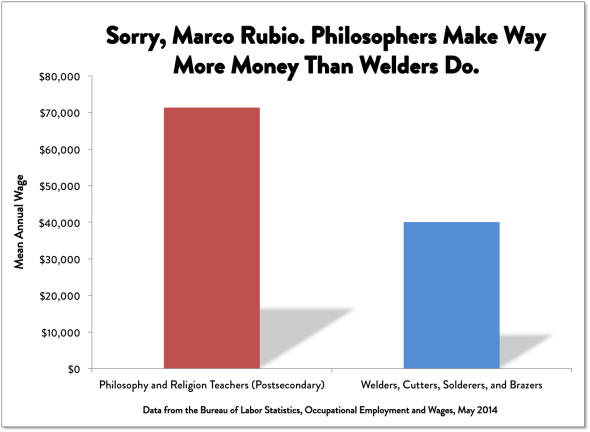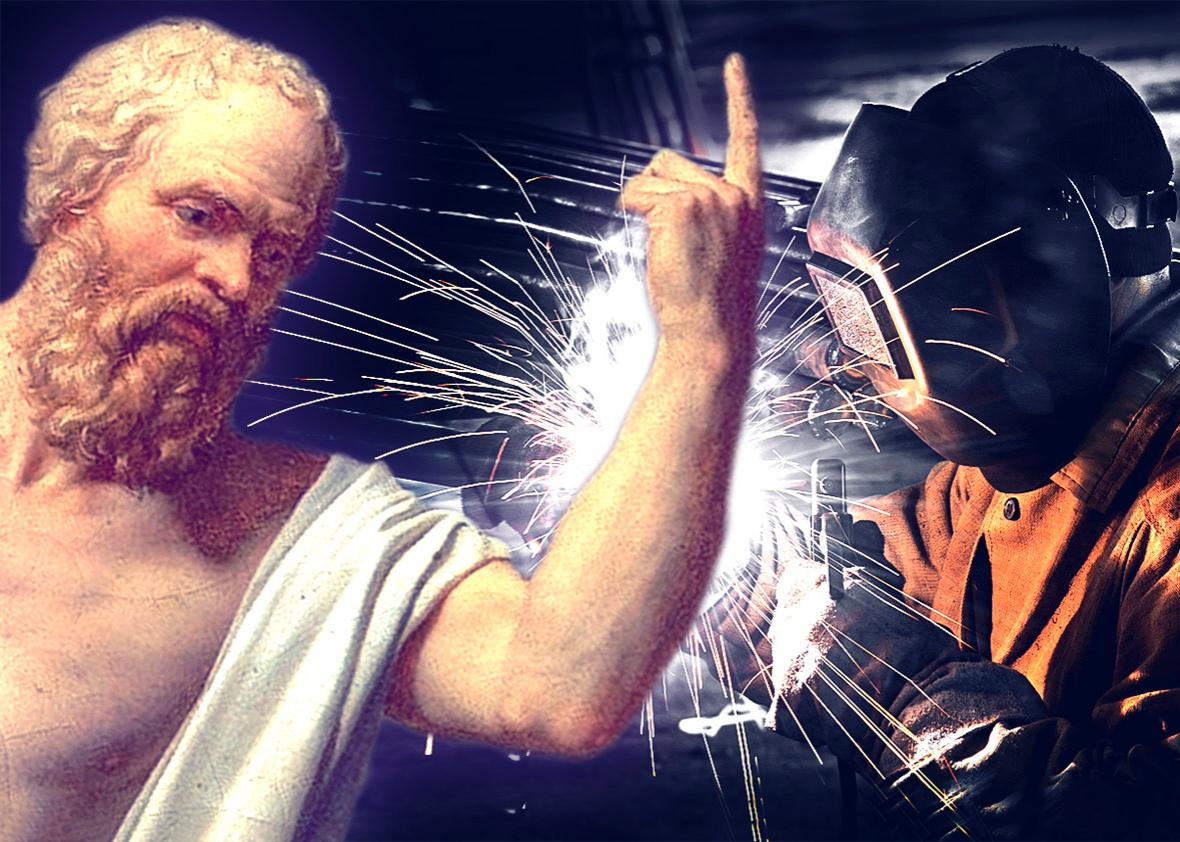Tuesday night, in the fourth Republican debate, Sen. Marco Rubio decided to make a point about the state of wages, education, and employment in America by comparing welders with philosophers. “For the life of me, I don’t know why we have stigmatized vocational education,” Rubio said. “Welders make more money than philosophers. We need more welders and less philosophers.”
This statement turns out to be incorrect on the most basic factual level. The mean annual salary of postsecondary philosophy and religion teachers—the best proxy for “philosophers” available in Bureau of Labor Statistics data—was $71,350 as of May 2014. For welders, cutters, solderers, and brazers—again, the best proxy for “welders” that the BLS has to offer—the mean annual wage from that same period was $40,040. We put this information in a chart, and served it up to the Internet.

Chart by Alison Griswold
Perhaps not surprisingly, there is a great deal of angst in the philosophy community over attempting to define and quantify what it means to be a philosopher vis-à-vis Labor Department data. This quickly became apparent from my email inbox and Twitter notifications, which over the past 12 hours have exploded with complaints about “disingenuous” and “cherry-picked” figures. As one reader wrote to me, “Your chart is irrelevant since it compares those teaching philosophy and religion at a post secondary level with those employed as welders. To rebut Rubio you would have to compare wages of those who studied philosophy in undergrad.”
On the one hand, I feel like the initial chart was pretty upfront about what data it contained. On the other, this is a valid critique. So in the interest of clearing the matter up, I dug into the numbers a little deeper.
Spoiler alert: Rubio is still wrong.
To get a better breakdown, I consulted the Brookings Institution’s Hamilton Project, which helpfully compiles career earnings for 80 different college majors, including “philosophy and religious studies.” You can’t compare the earnings for a particular major to a particular occupation, but I charted the median annual earnings for philosophy majors against that of people with an associate’s degree or a high school degree/GED. The associate’s degree data in particular is similar to the BLS data on mean annual wages for welders. (Associate’s degree holders earn slightly more, but it’s close enough to give you an idea.)
With that in mind, here’s a chart showing the median earnings of philosophy majors over their careers. This excludes anyone with a graduate degree but does account for part-time workers and people who’ve experienced unemployment during the year (click to expand):
Here’s that chart again, but this time including people with graduate degrees:
Having examined this data and at the risk of repeating myself, I’m going to say it again: Sorry, Marco Rubio. Philosophers make more money than welders do. Yes, the earnings gap is more dramatic for philosophy majors who go on to obtain additional degrees. But even for plain old college graduates, the philosophy students are outearning welders over the course of their careers. (Remember, welders actually make slightly less than the median person with an associate’s degree, so you have to mentally shift that green line down a little bit.)
Which of these two professions we actually need more of is a separate matter. As Business Insider pointed out this morning, the U.S. welding industry expects to be short about 400,000 workers by 2024 as aging operators retire and the number of incoming skilled workers declines. At the same time, do we really want to turn the U.S. into a nation of welders? (No offense to welders.) Does even Rubio? Here is a thing that Rubio said about closing the income inequality gap in February 2014:
Why is there an emerging opportunity gap? And the primary answer is because this new economy that we now live in—which is not an industrial economy, it’s a post-industrial economy—is a knowledge-based one.
In order to have middle-income, middle-paying jobs, the kinds of jobs that allow people to get ahead, you have to have higher level of training and skill acquisition and education than ever before. And we have too many people that don’t have those skills. And, in fact, the people who would most benefit from acquiring those skills are the ones least likely to get it because of its cost or because of the way the system is structured.
In other words, Rubio doesn’t seem to actually think we need a nation of philosophers or welders. Too bad!
